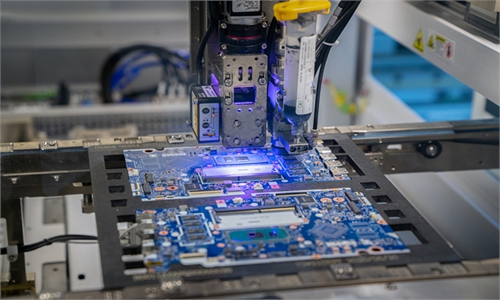Chip talent inadequacy exposed
Domestic semiconductor development hinges on cultivating future professionals

Photo: CFP
China's semiconductor market is the largest in the global semiconductor industry, accounting for about 35 percent of the global market share, much higher than the US, Europe and Japan. However, the development of China's semiconductor technology lags behind, exposing the urgent need of new talent to meet the growing market demand.
The talent shortage has been highlighted by the booming demand across the advanced manufacturing industry concerning 5G, smart phone and new-energy vehicles, and further exacerbated by US sanctions for chip supplies targeting Chinese technology companies and the whole semiconductor supply chain in which China is deeply attached.
To overcome a series of complex challenges, China needs to develop its own integrated circuits, posing the huge demand for specialist talent, Shen Xiaoliang, deputy general manager of National Integrated Circuit Innovation Center, told the Global Times on Wednesday.
Narrowing the gap
In recent years, the integrated circuit industry in the Chinese mainland has been in high-growth mode. In 2020, China's import of integrated circuit reached $350 billion, which was the largest imported trade product in China. But it's still unable to meet the rapid growth in demand, especially for high-end chips, which China is highly reliant on external providers.
"If you add up all affected areas, our national chip talent gap is probably about 600,000 specialists." Li Jingbo, dean of School of Semiconductor Science and Technology, South China Normal University, was cited by Beijing News on Tuesday as saying.
The most sought after talent is in the manufacturing and material sector in which there is still a big gap for future talent, Shen said. The talent shortage may affect the continuous advancement of a project and the balanced development of the industry.
China will still have a shortage of about 250,000 specialists by 2022, a White Paper on Talents in China's Integrated Circuit Industry 2019-2020 claimed.
"Chip talents involved in electronic information engineering, automation, microelectronics and other interdisciplinary, posing a certain gap between Chinese and foreign universities in terms of education level and emphasis on these majors," a semiconductor industry insider told the Global Times on Wednesday.
According to Quacquarelli Symonds' 2021 rankings by subject, among the world's top 20 universities for electrical and electronic engineering, seven are in the US, three in the UK, two in Singapore and two in Switzerland, and only one on the Chinese mainland, which is Tsinghua University.
Students choose to study math are offered more job opportunities and higher pay, while there were few who choose a major in photoelectric semiconductors. Even for those who were in the semiconductor related major, their career often lacks attractive roles.
In 2020, the department of electrical engineering of Tsinghua University had only 46 PhD graduates, with 29.03 percent of the graduates working in fields of electricity, heat, gas and water production and supply, while the rest are in sectors including education, finance and technical services.
"China's independent chip supply is not large, with domestic self-developed chip supply rate less than 20 percent. Therefore, integrated circuit talent have been diverted to finance and software industries," said Shen.
Despite some obvious shortage for high-end talent, the situation is expected to change given the huge market demand, the significance attached at a governmental level, and the call for the replacement of domestic production to fend off the impact from the US blockade, experts said.
This came as the country's prestigious Tsinghua University established the School of Integrated Circuits in April, the nation's first in offering a specialized major in the subject, targeting the research and training of technicians in semiconductors.
So far, 44 applicants for the Master of engineering in the field of electronic information are expected to be admitted to the school. And over a hundred candidates would be registered for Master's and Doctor's degree at the new school, open data shows.
Meanwhile, Peking University held inauguration at the School of Integrated Circuit on July 15, targeting the training of high-end talent for semiconductor design and manufacturing.
At the ceremony, a number of domestic chip related enterprises, such as SMIC, Yangtze Memory Technologies Co signed a contract with Peking University to conduct joint talent training.
Also in July, Huazhong University of Science and Technology established its College of Future Science and Technology and the College of Integrated Circuits.
In the past two years, 11 universities in China have set up integrated circuit colleges to enhance the importance of chip in universities, media reports.
These schools will hopefully raise the status of the whole integrated circuit in academic sector, promote the number of teachers and students, and strengthen the combination of talent training and practice, Shen said.
Vast market opportunities for talent
China's unique circumstance also offers vast opportunities for talent. Ye Tianchun, vice chairman and secretary-general of China Integrated Circuit Innovation Alliance, said that China's integrated circuit in the past 10 years, witessed the world's fastest development in speed, the growth rate of about 20 percent, while the growth rate of the global integrated circuit industry is only five or six percent, media reported.
In an era when the country pays more and more attention to the integrated circuit industry, with all the forces pouring into this industry, enterprise demand for talent is also increasing, together with the demand from downstream markets such as 5G, new-energy vehicles, intelligent terminal manufacturing and high-end mobile phones, where Chinese market is in the leading position in the world.
"When an industry develops rapidly, it is inevitable that there will be a shortage of talent, and the rapid development of the industry has led to a large demand for talent, which is the fundamental reason," Ye said.
While high-end integrated circuit talent cannot be immediately on the job after training, since they also need a certain amount of time to practice, so in the foreseeable 3-4 years, the overall gap for talent in China will further expand, experts said.


